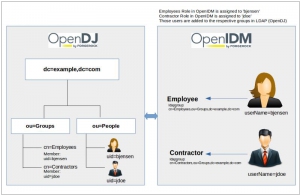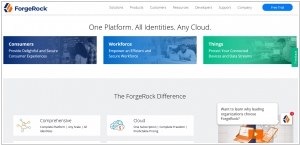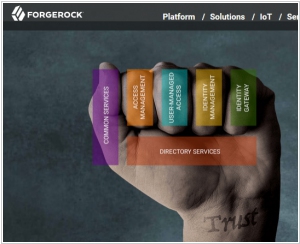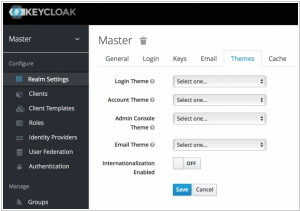ForgeRock vs Keycloak
August 06, 2023 | Author: Michael Stromann
12

Learn why businesses and governments trust ForgeRock identity and access management solutions for everything from CIAM to IoT. Protect, connect, and manage the digital identities of people, devices, and the internet of things (IoT). We help large organizations secure the identity of anything, build trusted, personalized relationships with their customers, and provide a seamless omnichannel experience.
ForgeRock and Keycloak are both popular open-source identity and access management (IAM) solutions, but there are some key differences between the two:
Company and Support: ForgeRock is a company that offers a comprehensive IAM platform, including identity management, access management, directory services, and other related features. ForgeRock provides commercial support options for their products, along with professional services and consulting. Keycloak, on the other hand, is an open-source IAM solution developed and maintained by Red Hat, a subsidiary of IBM. Keycloak has an active community of users and contributors, but does not offer commercial support options.
Technology Stack: Both ForgeRock and Keycloak are Java-based IAM solutions, but they have different technology stacks. ForgeRock uses a combination of Java-based components, including OpenDJ for directory services, OpenIDM for identity management, and OpenAM for access management, among others. Keycloak, on the other hand, is based on the Java-based WildFly application server and provides a single unified solution for identity management and access management.
Features and Capabilities: Both ForgeRock and Keycloak provide similar IAM features, such as authentication, authorization, single sign-on (SSO), social media logins, multi-factor authentication (MFA), and user self-service. However, the specific implementations and capabilities may differ between the two solutions. ForgeRock is known for its comprehensive and enterprise-ready IAM platform with extensive customization and integration options, while Keycloak is known for its simplicity and ease of use, making it popular for smaller-scale deployments and developer-friendly use cases.
Deployment and Integration: ForgeRock provides a wide range of deployment options, including on-premises, cloud, and hybrid deployments, along with support for various protocols and standards. ForgeRock also offers extensive integration options with other systems and applications, including custom connectors, REST APIs, and pre-built integrations with popular applications. Keycloak, on the other hand, is primarily designed to be deployed on-premises or in private clouds, and offers integration with other Red Hat products and technologies, such as the Red Hat JBoss Middleware.
Licensing and Cost: ForgeRock provides a commercial licensing model with different pricing tiers and support options for their IAM platform, along with a community edition that is free to use. Keycloak, on the other hand, is released under an open-source license (Apache 2.0) and is free to use and modify, but does not offer commercial support options. Organizations should carefully evaluate their budget and support requirements when considering ForgeRock or Keycloak.
Community and Ecosystem: Both ForgeRock and Keycloak have active communities of users, contributors, and partners. ForgeRock has a larger and more established community, along with a wide range of partners that provide consulting, implementation, and support services. Keycloak, being an open-source solution developed and maintained by Red Hat, has a growing community of users and contributors, but may have a smaller ecosystem of partners compared to ForgeRock.
In summary, the main differences between ForgeRock and Keycloak include company and support options, technology stack, features and capabilities, deployment and integration options, licensing and cost, and community and ecosystem. Organizations should carefully evaluate their specific requirements and use cases when choosing between ForgeRock and Keycloak for their IAM needs.
See also: Top 10 Identity Management platforms
Company and Support: ForgeRock is a company that offers a comprehensive IAM platform, including identity management, access management, directory services, and other related features. ForgeRock provides commercial support options for their products, along with professional services and consulting. Keycloak, on the other hand, is an open-source IAM solution developed and maintained by Red Hat, a subsidiary of IBM. Keycloak has an active community of users and contributors, but does not offer commercial support options.
Technology Stack: Both ForgeRock and Keycloak are Java-based IAM solutions, but they have different technology stacks. ForgeRock uses a combination of Java-based components, including OpenDJ for directory services, OpenIDM for identity management, and OpenAM for access management, among others. Keycloak, on the other hand, is based on the Java-based WildFly application server and provides a single unified solution for identity management and access management.
Features and Capabilities: Both ForgeRock and Keycloak provide similar IAM features, such as authentication, authorization, single sign-on (SSO), social media logins, multi-factor authentication (MFA), and user self-service. However, the specific implementations and capabilities may differ between the two solutions. ForgeRock is known for its comprehensive and enterprise-ready IAM platform with extensive customization and integration options, while Keycloak is known for its simplicity and ease of use, making it popular for smaller-scale deployments and developer-friendly use cases.
Deployment and Integration: ForgeRock provides a wide range of deployment options, including on-premises, cloud, and hybrid deployments, along with support for various protocols and standards. ForgeRock also offers extensive integration options with other systems and applications, including custom connectors, REST APIs, and pre-built integrations with popular applications. Keycloak, on the other hand, is primarily designed to be deployed on-premises or in private clouds, and offers integration with other Red Hat products and technologies, such as the Red Hat JBoss Middleware.
Licensing and Cost: ForgeRock provides a commercial licensing model with different pricing tiers and support options for their IAM platform, along with a community edition that is free to use. Keycloak, on the other hand, is released under an open-source license (Apache 2.0) and is free to use and modify, but does not offer commercial support options. Organizations should carefully evaluate their budget and support requirements when considering ForgeRock or Keycloak.
Community and Ecosystem: Both ForgeRock and Keycloak have active communities of users, contributors, and partners. ForgeRock has a larger and more established community, along with a wide range of partners that provide consulting, implementation, and support services. Keycloak, being an open-source solution developed and maintained by Red Hat, has a growing community of users and contributors, but may have a smaller ecosystem of partners compared to ForgeRock.
In summary, the main differences between ForgeRock and Keycloak include company and support options, technology stack, features and capabilities, deployment and integration options, licensing and cost, and community and ecosystem. Organizations should carefully evaluate their specific requirements and use cases when choosing between ForgeRock and Keycloak for their IAM needs.
See also: Top 10 Identity Management platforms
ForgeRock vs Keycloak in our news:
2020. ForgeRock nabs $93.5M for its ID management platform

ForgeRock, a company that has developed a platform focused on ensuring the authenticity of users accessing services and enabling organizations to effectively track and manage service usage, has secured $93.5 million in funding. In a competitive industry landscape, with notable players like Okta, LastPass, Duo Security, and Ping Identity vying for prominence in different aspects of identity management, ForgeRock has achieved remarkable success. It boasts an impressive customer base of 1,100 enterprises, collectively overseeing the management of 2 billion identities through its platform. Additionally, ForgeRock's platform supports the authentication and management of a significant number of devices, further highlighting its reach and impact.
2017. Identity management startup ForgeRock raised $88 million

Enterprise identity startup ForgeRock has recently announced the completion of an $88 million Series D investment round. What sets ForgeRock apart from its alternatives is its ability to authenticate not only users but also machines and sensors that seek access to your systems. According to CEO Mike Ellis, ForgeRock's approach to identity aligns with the ongoing developments in the industry. He emphasizes that security is increasingly driven by the relationships between humans, devices, things, and services. From its inception, ForgeRock has been diligently building a platform that can handle identity from various sources beyond human users. Ellis highlights the importance of existing everywhere, whether it's at the device and gateway level, such as in connected cars, or in on-premises and cloud environments.




